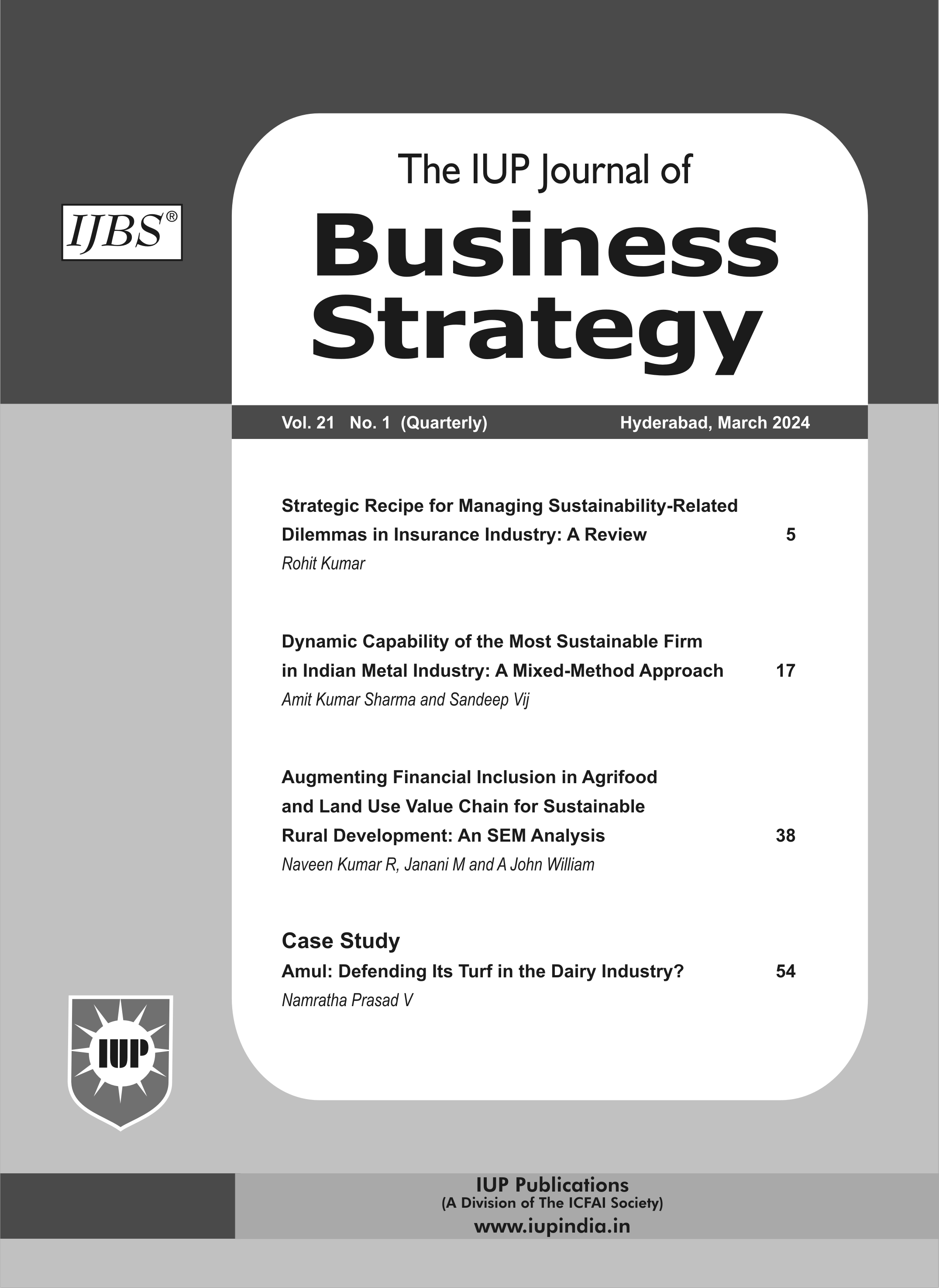
Dec'19
The IUP Journal of Business Strategy
Focus
Organizations have pursued outsourcing to reduce costs and improve efficiencies. Over the years, outsourcing has changed in meaning and character. It is no longer a cost-cutting or efficiency-enhancing tool but a strategic option for achieving competitive advantage. The second paper, "Outsourcing Project Management Services: Making It Work for IT or Digitally Outsourced Projects", by Nikhil Garg and Mohit Jain, elaborates the business of outsourcing in the Information Technology business. The author states that the reasons motivating organizations to outsource are changing permanently, with companies increasingly outsourcing to achieve customer-centricity and unlock new technological capabilities, rather than simply to cut costs. The study also analyzes factors that are expected to make outsourcing market more competitive and collaborative to both buyers and service providers who favor contracts based on outcomes rather than outputs.
The Indian television industry has grown and matured over the years. The government's role in this growth cannot be discounted. The controlling agency, TRAI has played a key role in this transformation. The third paper, "The Impact of TRAI's Tariff Order on the Indian Television Industry: An Exploratory Analysis", by Diwahar Sunder Nadar, analyzes the impact of TRAI's orders. India is a vast market for television content. The existence of public and private players in this crowded market (358 broadcasters and 875 private channels) calls for greater regulation. This, however, must help market growth and improve customer experience at the same time. The author analyzes the impact of eight orders issued by TRAI on channel pricing and bouquet discounts. The results of the analysis reveal that there have been changes in pricing at the last mile where prices of HD channels have reduced as compared to SD channels which have increased. The study provides interesting insights into how consumer preferences have changed over time and how TRAI and the whole eco system have helped create the necessary environment for benefiting the customers.
Consulting Editor
|
|
|||
| Article | Price (₹) | ||
| Using Human Resource Management to Drive Business Strategy: The Case of BAE Systems |
100
|
||
| Outsourcing Project Management Services: Making It Work for IT or Digitally Outsourced Projects |
100
|
||
| The Impact of TRAI's Tariff Order on the Indian Television Industry: An Exploratory Analysis |
100
|
||
Using Human Resource Management to Drive Business Strategy: The Case of BAE Systems
BAE Systems is the 3rd largest defense company in the world, the largest outside of the US, and in 2016, they reached sales of 25 bn. Their vision is to be the premier international defense aerospace and security company in the world. This vision is vague and 'premier' can be interpreted in quite a few ways. They have mission and strategic objective statements that qualify how they are going to reach their vision. In this paper, the authors interpret what BAE Systems means when they state that they want to be the 'premier' defense company. The authors do this by examining the evidence supporting a strategy that aligns with financial dominance (focus on sales), product quality dominance (focus on R&D), or global dominance (focus on spread of operations).
Outsourcing Project Management Services: Making It Work for IT or Digitally Outsourced Projects
The purpose of this study is to understand the motives behind outsourcing as it is becoming inevitable for reasons like cost reduction, operational efficiencies, etc. Further, the study investigates the pitfalls of outsourcing as well. The information for this investigation includes a few specific cases of various companies that are outsourcing their project management services. The information is collected from various papers, annual reports and relevant journals. The reasons motivating organizations to outsource are also changing permanently, with companies increasingly outsourcing to achieve customer-centricity and unlock new technological capabilities, rather than simply to cut costs. This study analyzes factors that are expected to make outsourcing market more competitive and collaborative as both buyers and service providers are heavily in favor of basing contracts on outcomes rather than outputs, choosing to share risk to reap greater rewards.
The Impact of TRAI's Tariff Order on the Indian Television Industry: An Exploratory Analysis
The Indian television sector is one of the most promising sectors with an ever-increasing penetration rate, economic value addition and improvement in technology. The sector has been plagued by unfair prices due to an inefficient market system. The Telecom Regulatory Authority of India (TRAI) which has been regulating the market for two decades has issued eight tariff orders with the objective of moving towards an a la carte policy. The implementation of the a la carte system has modified the channel prices and the dimensions of the sector which mandates research. The study, in an attempt to analyze the tariff orders and channel prices, has employed a theoretical review of the eight tariff orders and descriptive analysis of channel and bouquet prices. The descriptive analysis was conducted in a multi-dimensional manner which includes channel type, language, broadcasters and bouquet. The study concluded that channel prices have changed at an average of 91% per channel and the bouquet discounts changed by 67%. The results implied that the tariff order objective was attained. The study approaches the bundle v/s a la carte tariff policy paradigm with a practical approach unlike previous studies which have focused more on multivariate economic modeling.